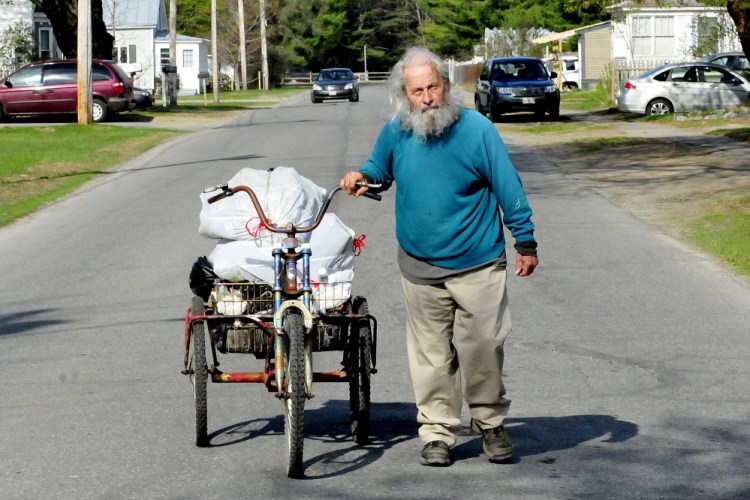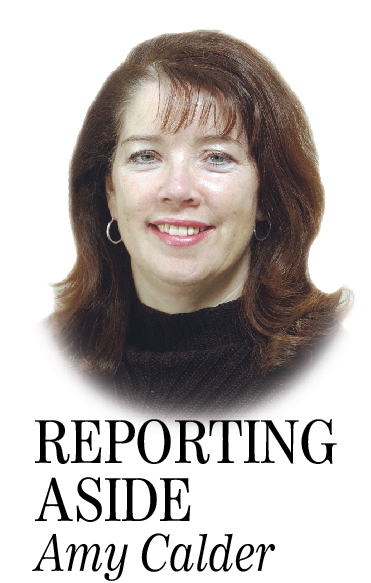Neil Woodard lumbered along Beech Street in Skowhegan, pushing his three-wheeled bike, its metal basket piled high with bags of bottles and cans.
Woodard, 70, moved along steadily, his long white curly hair and beard blowing back in the early morning breeze. The birds chirped, it was sunny and warm, and the streets were quiet.
“I built this bike in three or four parts,” he said. “I built it from the ground up and when I got it done, I said, ‘Honey,’ and I pictured she said, ‘What?’ ‘You’re my baby girl. I don’t want anybody to take you from me.”
The bike, which has no seat, chain or pedals, is Woodard’s lifeblood. For many years, he has used it for collecting bottles and cans along Skowhegan roads. He finds them in ditches, on curbs and in parking lots.
Often, people will come out of their houses to hand him a few.
“I just walk, walk, walk, walk, walk. I go by and people say, ‘Hey, Neil, come here.’ I’ll say, ‘What?’ And they say we got empties for you. If I’m lucky, I get 20-something-dollars a day from the empties. The average is around $15 or $10.”
Seven days a week, a few hours every morning, he’s out on the streets, pushing. He can fit three large plastic bags of cans and bottles in the metal basket, and he ties plastic grocery bags full of bottles on the bike’s handlebars.
He walks every day, but he doesn’t know exactly when because he does not have a watch or clock and pays no attention to time.
“I don’t care what time it is, long as I can get up off my backside, grab my bike and say, ‘Honey, want to get some beer?'”
If you ask how many years he has lived in Skowhegan, he says it’s been a long time.
“I grew up in Bingham, across from the graveyard. I had three brothers, two sisters, two beautiful grandmothers and wow, did I enjoy life. When I was born, it was like in the past when there were antique cars, and I said, ‘Grandpa, Dad, what am I supposed to do?’ They said, ‘Enjoy yourself because it’s going to change.’ I said, ‘Why?’ They said, ‘Because it’s going to get into the future.’ I said I don’t want it to.”
Talking about growing up in Bingham makes Woodard smile big, as the sun hits his light blue eyes and 5-foot-2-inch frame, clad in a blue sweatshirt and khakis he got from a local church.
“It was beautiful in Bingham. It was like, the sky was always blue, clouds were always white, sun was always out. I just loved it.”
He can’t remember just when he started collecting bottles and cans from the roadside, but he felt compelled to do it when he saw a lot of people throwing them out of their cars.
“I asked my grandfather, ‘What can I do?’ He said, ‘Well, get something to haul with you and pick them up, put them in a bag, take them, because there’s going to be a redemption center soon.’ He had a farm and a stallion, Prince. I love horses. I grew up around them, nothing but work horses and one stallion. Then, time marches on. Things seemed to change, got more modern. After I graduated, I just said, ‘Grandpa, I’m leaving. I’m going.’ He said, ‘Where you going to go?’ And I said Skowhegan, where the most beautiful women are, and I’m not coming back. I was in my teens.”
Skowhegan has been Woodard’s home ever since. He lives in an apartment on Beauford Street where he goes to relax after a morning of work. He’ll have a sandwich and a Budweiser, his favorite beer, he said.
Woodard knows everybody in town, and everybody knows him, he said. He likes police officers and sheriff’s deputies. He said he had four cousins who were deputies.
“Yesterday, I cross the road and I saw a cruiser. The policewoman was sitting in the driver’s seat, and she waved and I waved and I said, ‘How are you?’ and she said, ‘Good.’ I gave her like a blowing kiss and she said, ‘How you doing?’ I said I’ve been trying to get my knee to stop aching.”
Last year, toward the end of the winter, Woodard said he was on Beauford Street and tripped over a chunk of ice and fell and broke his right hip.
“I banged my knee and it’s still stiff. There was nobody around. I had to drag myself the length of a whole building to my steps and get the door open. I went in the room. Charlie, he owns the building, he sent a message to the hospital, and they came that night to pick me up. I met the doctor, and he put my hip back together again. Boy! He showed me how he did it. He showed me a picture of my leg. He said it’s bionic. I said, ‘Huh? I’m bionic?’ And he said, ‘Yes, that’s the only way we could have done it.'”
Woodard then told me a story about the doctor who put him back together, Michael Curran.
“He cares about people. He doesn’t want anybody to think bad of him because he does it with love. I said to myself, ‘Woodard, enjoy Dr. Curran as your buddy.’ Dr. Curran, he cares about people. He cares if you’re alive, he cares if you’re dying, he cares if you are dead. You’re his best friend.”
Woodard had to adapt to being indoors after his injury. He underwent surgery at Redington-Fairview General Hospital in Skowhegan.
He has no children, but was married once, a long time ago, but it didn’t last — maybe a half-year, he said.
“I’m still in love with her. I want her here right now.”
One of his favorite places is George’s Banana Stand on North Avenue, where he buys food and where a clerk gave him the hiking boots he wears.
“I like apples and bananas — anything that’s got anything to do with living on trees. I’ll just go up and take apples when I see them.”
Woodard says he also likes mail carriers and children.
“The kids will say, ‘Hi Neil, how are you? I’ll say, ‘How are you?’ Their cat or dog will come out and I’ll say, ‘Hi Boogie, how are you?’ Oh, I love Skowhegan. I love Skowhegan girls, the cops, the sheriffs. It’s like an Indian town. I’m an Indian. I’m Apache. I’m half Apache and half Irish. Skowhegan cares about people. I don’t know why, but they just care about the life and time. They just plain care. You are a human to them.”
I asked if he had heard about the recent controversy surrounding the “Indians” mascot and nickname for Skowhegan schools and whether it should be changed.
“I don’t want it changed because the Skowhegan Indian lived a life of the way it should have been, and Skowhegan people care. I don’t care about what people think of Indians. I’m one Indian. We’re tough, strong, we are about the life. I live my life my way, and they can live their life their way. I love the people here in Skowhegan. I love the kids. I love the animals. I just love the life of Skowhegan.”
We had talked a long time and Woodard had to move on, but he left me with one final comment: that he loves being alive.
“When the day comes and I hear, ‘You are going to die,’ I’ll say, ‘Oh, what’d I do wrong?’ I just wish I could live forever — never die. If I do die, I want to come back and live life like a horse or a dog or a cat. I don’t want to leave Skowhegan.”
He waved goodbye and, pushing his bike and limping a little, turned south onto Smith Street.
Amy Calder has been a Morning Sentinel reporter 27 years. Her column appears here Mondays. She may be reached at acalder@centralmaine.com.
Send questions/comments to the editors.




Comments are no longer available on this story